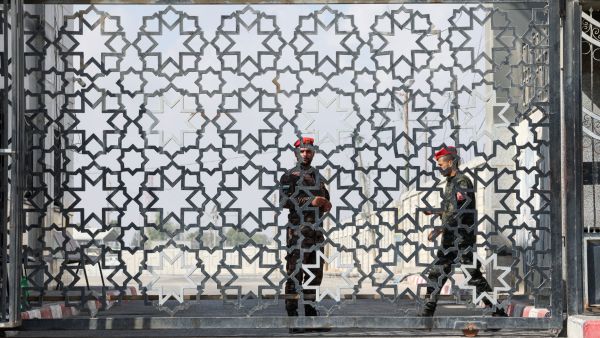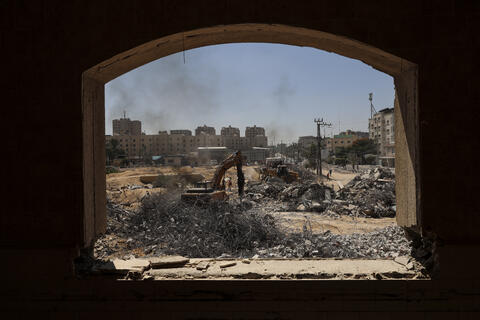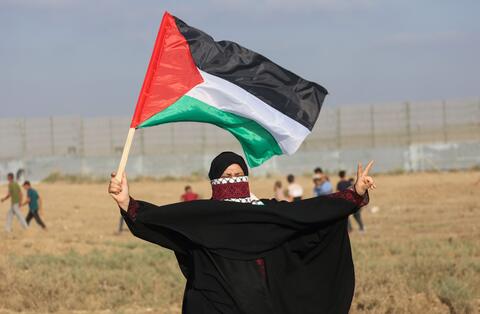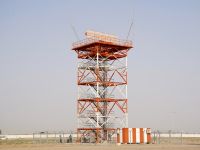Egypt is trying to moderate the behaviour of Hamas through its control of the Rafah crossing border, after recent moves by the militant Palestinian group threatened to undermine the results of Cairo’s mediation aimed at preventing the violation of the ceasefire agreement.
Palestinian sources told The Arab Weekly that Egypt’s decision, Monday, to close the Rafah crossing, until further notice, reflects Cairo’s concern that military moves by Hamas could ratchet up tensions with Israel, leading to a fresh outbreak of hostilities.
"We were informed by the Egyptian authorities that the Rafah crossing will be closed tomorrow, Monday, in both directions" https://t.co/t5u2uwxBgT
— Middle East Eye (@MiddleEastEye) August 22, 2021
The same sources added that the closure decision came after information reached Cairo that the militant movement was using escalation to sidestep it troubles at home where its hard-line management of many vital issues has led to worsening crises and a rise in popular discontent.
A spokesman for the Hamas interior ministry, Iyad al-Buzum, confirmed on Sunday that Egypt had informed the authorities in the Gaza Strip that it would close the Rafah crossing, which links Gaza and Sinai, in both directions, starting on Monday.
According to Egyptian sources, the closure was for security reasons following a flare-up of tensions last Saturday between Israel and Hamas, when Israeli planes bombed sites in Gaza following an exchange of fire across the border between the two sides.
No official statements were made from Cairo over the likely duration of the closure, indicating that the final decision will depend on a change in Hamas’ behaviour.
Cairo had decided to open the Rafah crossing before the ceasefire in the Gaza Strip on May 21 in order to send in humanitarian aid and allow the wounded in the Gaza Strip to receive medical treatment in Egypt after 11 days of war between Israel and the Palestinian movement.
Cairo had believed that the success of its mediation in clinching a ceasefire agreement would lead to a long-term truce in Gaza that would create a new situation in the Strip, reduce divisions between Palestinian factions, help with the formation of a national unity government and allow for the resumption of negotiations between Israel and the Palestinian Authority.
But Egyptian hopes have been dashed, as Hamas returned to its previous political and security ways in Gaza and failed to respond to Cairo’s proposals on a number of issues designed to usher in greater security and stability in the long run.
Hamas’ insistence on giving priority to military moves appeared to abort Egypt’s initiatives, despite the shuttle mediation undertaken by intelligence chief Major General Abbas Kamel last week between Israelis and Palestinians in order to pre-empt the risks of armed confrontation.
Cairo is wary that Hamas’ moves could trigger escalation from Israel, whose new prime minister, Naftali Bennett, wants to prove his firm military resolve, after he passed the first difficult test of cabinet formation.
Observers point out also that the circumstances of the transfer of the Qatari grant ($30 million) to Gaza through the United Nations (and the scrapping of the previous mechanism that was supervised by Hamas) have created a major crisis for the Palestinian movement, as the instalment allocated to the salaries of Hamas employees was deducted ($10 million) from the total aid amount.
Hamas resorted to hiking tensions in order to pressure Israel and the United Nations to recover the whole amount of the aid, which would help it contain any discontent within the movement’s cadres.
Egypt asked Hamas to stop violent moves, limit itself to peaceful popular protests and also avoid approaching the barbed wire fence that separates Gaza from Israel. But the movement instead pushed hundreds of young people towards the fence who inevitably clashed with the Israeli forces.
Analysts believe Hamas sees no point in continued truce with Israel, which pushed Cairo to resort to pressure by closing the key Rafah crossing.
In doing so, Egypt takes the risk of being portrayed by Islamist figures, echoed by Turkish and Qatari media, as bringing about humanitarian hardship in Gaza. But Cairo pereceives its decision as necessary considering its own national security imperatives.
It even sees the risk that the simmering domestic tensions in Gaza could lead to a Palestinian rush towards the Rafah crossing without security controls.
Egypt says it closed its border crossing into occupied Gaza Monday until further notice.
— AJ+ (@ajplus) August 23, 2021
The Rafah crossing is the sole border point in Gaza not controlled by Israel.
Israel imposed the blockade on Gaza in 2007, which which activists call “collective punishment.” pic.twitter.com/9lPZRmAONY
Nevertheless, Professor of Political Science at Al-Quds University Ayman Al-Raqab said he believed that Egypt has restored relations of trust with the population in Gaza through the efforts it had made to rebuild the Strip, sending rubble removal equipment and pledging generous financial aid to repair the infrastructure. Palestinians in Gaza warmly welcomed Egypt’s help.
He further told The Arab Weekly that Cairo was looking for common ground to resolve the many of the thorny issues, including work on a prisoners’ exchange deal and lifting Israeli siege on Gaza. Egypt wants to ensure the security and stability of the Strip, which are closely linked to Egypt’s own security.
This article has been adapted from its original source.










